The Origins of Gothic Literature
“The Origins of Horror Literature” is a weekly series by West 10th’s Editor-in-Chief Travis Schuhardt during the month of October, explaining how the Gothic and Horror genres developed, offering recommendations on which classic Gothic tales and modern horror stories to check out, and discussing some horror-themed journals to submit your writing to during the Halloween season.
October 14th. Truly the midst of the Halloween season. And there’s no better way to get into the spirit of the season than a deep dive into the murky, terrifying territories of Gothic Literature and Horror Fiction. Each week, we will be exploring the surprising history of Gothic Literature, and recommending modern day horror stories to keep you up at night.
Many people believe the Gothic genre began and ended with Mary Shelley’s Frankenstein, and this is simply not the case. The first tale that truly sparked an interest in the Gothic — and defined a lot of what we consider Gothic today — was written by a man named Horace Walpole and was called The Castle of Otranto.
Before we talk about the story, however, you need a little context. Horace Walpole was born in the early 18th century, and, if you were to go to London around that time, you would see very few medieval-looking castles, and those you would see would have fallen into disuse and disrepair. Buildings constructed in the Medieval Era were windowless and uncomfortable, cold and dank; if you were a member of the nobility in the 18th century, very reasonably you would want to live somewhere warmer, more comfortable. Many members of the nobility, were they to own a castle from their ancestors, would even tear them down for parts to build other residences.
Horace Walpole did not own a castle. One day, however, he decided that he wanted one. Thus, he began constructing his own castle. He called it Strawberry Hill House, and built it in the medieval style, but differed slightly in that he included stained-glass windows that you might see in churches. This style laid the foundation for a Gothic revival in the architecture of London.
But what does this have to do with literature? Well, whilst living in Strawberry Hill House, Horace Walpole, as the story goes, had a nightmare about a floating suit of armor that took place in the house that he lived, a Gothic-styled Castle. So, when he went to write down his dream and turn it into a novel, he wrote a story that took place in a castle that involved ghosts haunting suits of armor, as well as other supernatural elements. These elements came to define the Gothic genre of literature, all the way to today’s modern Gothic, informing even series like Scooby-Doo.
The spooky terrors that come to mind when we all think of Halloween night — the ghosts, the ghouls, the castles, the monsters — all sprouted from the nightmare of one man, living in his fake castle in the 18th century.
If you’d like to check out The Castle of Otranto, you can find the entire book online at this link:
I, personally, would not recommend the read, as it can be a bit slow and confusing, but it is there if you’d like to see the origins of the Gothic genre.
Reading Recommendation: As for stories I would recommend to get you in the Halloween mood, Brian Evenson’s short story No Matter Which Way We Turned is a spooky, quick, two-page read that’s great to share around a campfire or even in your room by candlelight if you’re looking for a scare, or to be just a little unsettled. If you read it, let us know what you think!
Places to Submit: Don’t think we’d leave you out to dry with no places to submit. Check out these places to submit your Halloween-themed or horror writings!
1. If you’re interested in writing Folktales, or have a great local horror story from back home, try here:
https://www.nosetouchpress.com/call/
The requirements are 4,000-8,000 words and submissions open November 1st and run until January, so you have all of Halloween season (and beyond) to inspire you.
2. If you’re already sitting on a horror story or some dark fiction that just needs a little touch up, then I’d recommend submitting to LampLight:
https://lamplightmagazine.com/submissions/
Up to 7,000 words; submissions open on October 15th and close December 15th. This publication does publish reprints, meaning if you already have a horror story posted somewhere, say a blog of sorts, you can still submit here as well!
3. You can submit your poems, short stories, and artwork to us starting today! Click the submit tab to find out how. This is not a horror or Halloween themed submission; just send us your best! We’re open until mid-December. Hope to see your work there!
Thank you for reading, be sure to subscribe and check back every week for stories, poems, reading recommendations, and places to submit your work!
All historical information in this article comes from the NYU class “Gothic Literature.”

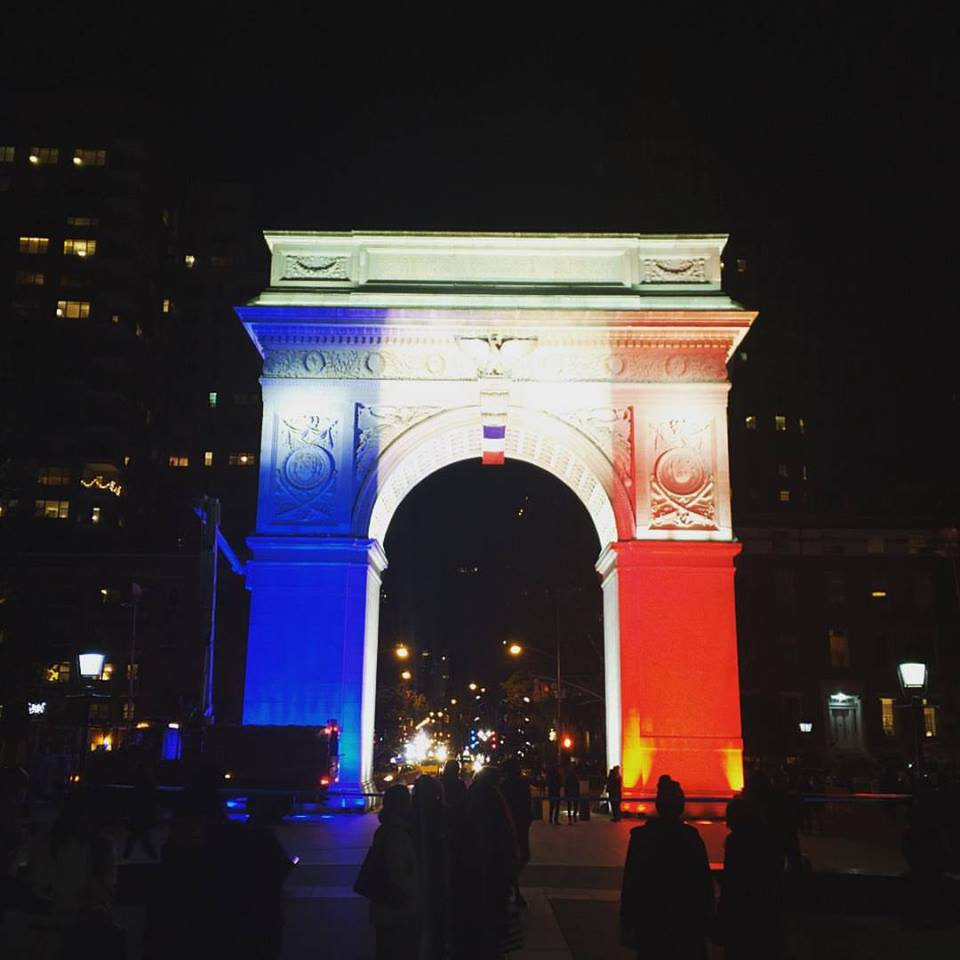
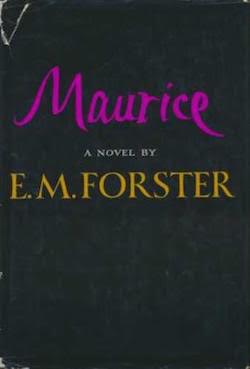 Written in 1913 but only published posthumously in 1971, Maurice was well ahead of its time in its nuanced depiction of a young man discovering and coming to terms with his sexuality. While Forster carefully examines the difficulties of identity and love, Maurice is ultimately founded on the belief that same-sex relationships have the capacity to be profound, beautiful and happy—a radical thesis for a novel written when men were still routinely arrested and imprisoned for having sex with other men.
Written in 1913 but only published posthumously in 1971, Maurice was well ahead of its time in its nuanced depiction of a young man discovering and coming to terms with his sexuality. While Forster carefully examines the difficulties of identity and love, Maurice is ultimately founded on the belief that same-sex relationships have the capacity to be profound, beautiful and happy—a radical thesis for a novel written when men were still routinely arrested and imprisoned for having sex with other men. 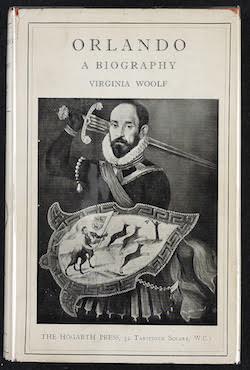 Subtitled “A Biography,” Orlando was written as a paean to Woolf’s friend and erstwhile lover, the aristocratic Vita Sackville-West. With typical élan, Woolf transforms Sackville-West into the novel’s eponymous protagonist, a sex-changing immortal who begins as an Elizabethan nobleman and ends as a successful female author in ‘the present day’ (that is to say, 1928). Traversing three hundred years of Orlando’s life, Woolf relentlessly questions conventional notions of history, authorship, gender and sexuality. Nightwood - Djuna Barnes (1936)
Subtitled “A Biography,” Orlando was written as a paean to Woolf’s friend and erstwhile lover, the aristocratic Vita Sackville-West. With typical élan, Woolf transforms Sackville-West into the novel’s eponymous protagonist, a sex-changing immortal who begins as an Elizabethan nobleman and ends as a successful female author in ‘the present day’ (that is to say, 1928). Traversing three hundred years of Orlando’s life, Woolf relentlessly questions conventional notions of history, authorship, gender and sexuality. Nightwood - Djuna Barnes (1936)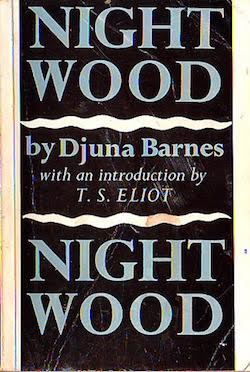 Contained in a deceptively slim volume, Nightwood is a superbly stylized portrait of a doomed lesbian relationship in the bohemian Paris of the interwar years, explicated through the head-spinning speeches of Dr. Matthew-Mighty-grain-of-salt-Dante-O'Conner (who is just as campy as his name suggests). This modernist masterpiece was lauded by T.S. Eliot as “so good a novel that only sensibilities trained on poetry can wholly appreciate it.” Notre Dame des Fleurs/Our Lady of the Flowers - Jean Genet (1943)
Contained in a deceptively slim volume, Nightwood is a superbly stylized portrait of a doomed lesbian relationship in the bohemian Paris of the interwar years, explicated through the head-spinning speeches of Dr. Matthew-Mighty-grain-of-salt-Dante-O'Conner (who is just as campy as his name suggests). This modernist masterpiece was lauded by T.S. Eliot as “so good a novel that only sensibilities trained on poetry can wholly appreciate it.” Notre Dame des Fleurs/Our Lady of the Flowers - Jean Genet (1943)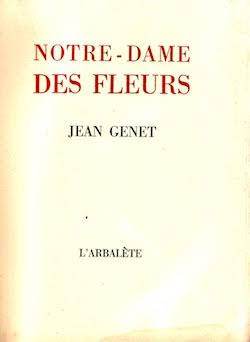 Similarly to Nightwood, this novel renders the Parisian underworld in prose so rich and revelatory it practically creates a new class of literature. The lives and loves of its central characters—sex workers, trans women, and teenage murderers, all bearing charming monikers like Divine and Darling Daintyfoot—are unspooled by a capricious narrator who creates the world of the novel while masturbating in his prison cell (!!!). The Charioteer - Mary Renault (1953)Renault, having worked as nurse at a British military hospital during the Second World
Similarly to Nightwood, this novel renders the Parisian underworld in prose so rich and revelatory it practically creates a new class of literature. The lives and loves of its central characters—sex workers, trans women, and teenage murderers, all bearing charming monikers like Divine and Darling Daintyfoot—are unspooled by a capricious narrator who creates the world of the novel while masturbating in his prison cell (!!!). The Charioteer - Mary Renault (1953)Renault, having worked as nurse at a British military hospital during the Second World 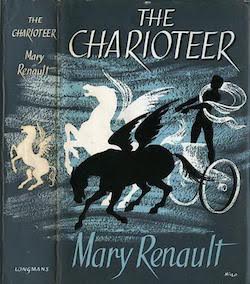 War and later emigrated to South Africa to live with her female partner, was uniquely equipped to write this novel, which follows a British soldier who falls in love twice over as he recovers from a combat wound. With equal measures of heartfelt psychological insight and cutting social observation, The Charioteer struggles with the tensions between idealism and reality, individualism and community, and innocence and experience. Another Country - James Baldwin (1962)An earlier novel of Baldwin’s, Giovanni’s Room, is often hailed as a masterpiece of gay literature, but while Giovanni’s Room is a claustrophobic investigation of one man’s psychology, Another Country seems to encompass an era.
War and later emigrated to South Africa to live with her female partner, was uniquely equipped to write this novel, which follows a British soldier who falls in love twice over as he recovers from a combat wound. With equal measures of heartfelt psychological insight and cutting social observation, The Charioteer struggles with the tensions between idealism and reality, individualism and community, and innocence and experience. Another Country - James Baldwin (1962)An earlier novel of Baldwin’s, Giovanni’s Room, is often hailed as a masterpiece of gay literature, but while Giovanni’s Room is a claustrophobic investigation of one man’s psychology, Another Country seems to encompass an era. 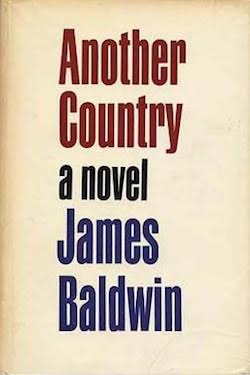 The characters are gay, straight, bisexual, questioning and in denial; white and black; working-class and middle-class and destitute and wildly successful. In a rhythm reminiscent of jazz, the novel traces the cast as they move in and out of each other’s lives, coupling and splitting up and getting back together, rising and falling in fortune—but always circling around the specter of a character who commits suicide at the end of the novel’s first act.
The characters are gay, straight, bisexual, questioning and in denial; white and black; working-class and middle-class and destitute and wildly successful. In a rhythm reminiscent of jazz, the novel traces the cast as they move in and out of each other’s lives, coupling and splitting up and getting back together, rising and falling in fortune—but always circling around the specter of a character who commits suicide at the end of the novel’s first act.